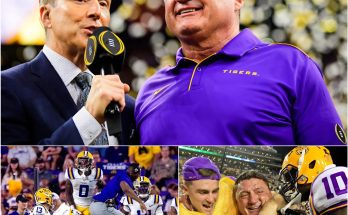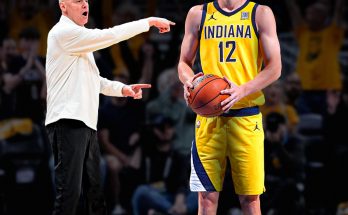Former Tennessee player Grant Frerking reportedly served as a consultant for the Volunteers to help the program navigate scams and fraudulent schemes.
Grant Frerking, once known primarily for his contributions on the football field as a wide receiver for the Tennessee Volunteers, has transitioned into a unique and crucial role that highlights both his business acumen and deep loyalty to his alma mater. According to reports, Frerking has served as a consultant for the Tennessee football program, providing guidance to help the team and university navigate the increasingly complex world of scams and fraudulent schemes. His efforts underscore a broader shift in college athletics, where the protection of student-athletes and institutions from bad actors has become as vital as on-field success.
Frerking’s background makes him an ideal fit for such a role. While his playing time for the Volunteers may not have made national headlines, what distinguished him during his college years was his entrepreneurial spirit. Frerking founded his own company, Metro Straw, while still a student-athlete, and quickly developed a reputation for balancing the demands of college football with the challenges of running a successful business. This experience exposed him not only to the complexities of managing a company but also to the types of predatory practices that can target young entrepreneurs and athletes alike. That foundation has proven invaluable in his consulting work with Tennessee.
The modern era of college athletics presents both tremendous opportunities and significant risks for student-athletes. The advent of name, image, and likeness (NIL) rights has transformed the collegiate sports landscape, allowing players to earn money and build personal brands in ways that were unthinkable just a few years ago. Yet, with these opportunities come new vulnerabilities. Athletes, often still teenagers or in their early twenties, may lack the financial literacy or experience needed to distinguish legitimate business partners from opportunists looking to exploit their fame or naivety.
That’s where someone like Frerking becomes essential. As reports indicate, his work with Tennessee involves advising players, staff, and administrators on best practices for identifying, avoiding, and responding to potential scams. Whether it’s fraudulent agents offering too-good-to-be-true endorsements, deceptive financial advisors pushing risky investments, or con artists seeking to entangle athletes in dubious business ventures, the threats are numerous. Frerking’s guidance helps create a protective barrier, empowering student-athletes to make informed choices while focusing on their academic and athletic pursuits.
Frerking’s role reportedly extends beyond just offering general advice. He is said to have helped Tennessee develop protocols and educational programs designed to raise awareness among athletes about the specific dangers they may encounter. These sessions provide players with real-world examples of scams that have ensnared others, showing how even small missteps can lead to devastating consequences. By contextualizing the risks in a manner that resonates with young athletes, Frerking ensures that his message doesn’t just go in one ear and out the other.
In addition to these educational efforts, Frerking has also worked to build stronger relationships between Tennessee’s athletic department and trusted external partners. Whether it’s reputable financial planners, attorneys, or marketing professionals, having a vetted network of experts available to student-athletes can make a substantial difference. When athletes know where to turn for reliable advice, they are less likely to fall victim to shady operators who promise the world but deliver only heartache.
The decision by Tennessee to bring Frerking into this consulting role reflects the university’s proactive stance on safeguarding its athletes. As NIL opportunities grow and the market for college athletes’ services and endorsements becomes more lucrative, institutions must be forward-thinking in how they protect their players. Gone are the days when simply offering compliance training on NCAA rules was sufficient. Today, universities must address issues ranging from cyber fraud to contract scams to cryptocurrency schemes that can entangle the unwary. Frerking’s work represents a critical piece of this broader effort.
It’s worth noting that Frerking’s involvement is also symbolic of a deeper trend in college sports: the increasing reliance on former athletes to serve as mentors and protectors for the next generation. Former players like Frerking understand firsthand the pressures, temptations, and pitfalls that can accompany life in the public eye. They can connect with current athletes on a level that external consultants or administrators may struggle to achieve. By leveraging his own experiences—both good and bad—Frerking can speak with credibility, offering guidance that feels authentic rather than obligatory.
Moreover, Frerking’s story offers an inspiring blueprint for what life after sports can look like. Too often, narratives about athletes’ post-playing careers focus on those who struggle to adjust or find their purpose. Frerking stands as an example of someone who has successfully translated the discipline, teamwork, and strategic thinking honed on the football field into success off of it. His journey shows current athletes that their identities are not limited to their roles as players, and that the skills they develop through sports can open doors in business, leadership, and beyond.
While Frerking’s exact contractual terms with Tennessee have not been publicly disclosed, reports suggest that his services have been highly valued by the program. The university’s willingness to invest in this type of consultant reflects not only the realities of the modern NIL environment but also a genuine commitment to the holistic well-being of its athletes. Tennessee’s approach serves as a model for other schools navigating similar challenges. As the collegiate athletics world evolves, programs that fail to provide robust support systems risk seeing their players fall prey to those looking to exploit them.
The response from Tennessee’s athletes to Frerking’s involvement has reportedly been positive. Players appreciate having access to someone who has walked in their shoes and understands the unique challenges they face. By making himself available for one-on-one consultations as well as group sessions, Frerking ensures that athletes feel supported and heard. His approachable demeanor, combined with his deep knowledge of both sports and business, helps foster an environment where players feel comfortable seeking advice before problems arise, rather than after it’s too late.
Beyond Tennessee, Frerking’s work could signal the emergence of a new type of role in college athletics. As NIL rights expand and the commercial stakes of college sports continue to rise, other universities may look to create similar positions or engage former athletes in consulting capacities. Schools will need to innovate and adapt if they are to stay ahead of the challenges posed by this new era. In that regard, Tennessee’s partnership with Frerking may be viewed as an early and visionary step.
In the bigger picture, Frerking’s contributions highlight the intersection of athletics, education, and personal development. College sports at their best are about more than wins and losses—they are about preparing young people for life beyond the playing field. By helping Tennessee’s athletes safeguard their futures and build the skills they need to navigate a complex world, Frerking plays a part in fulfilling that mission. His work ensures that student-athletes leave the university not just as better players, but as smarter, more resilient individuals ready to face whatever challenges come next.
For Grant Frerking, what began as a passion for business during his time as a Volunteer has evolved into a purpose-driven career that continues to benefit the program he loves. His unique blend of experience, insight, and integrity makes him a valuable asset not only to Tennessee but to the broader conversation about how best to support and protect student-athletes in the modern era. As universities, athletes, and the wider sports community grapple with the complexities of this new landscape, Frerking’s work serves as a reminder that proactive measures, rooted in real-world experience, can make all the difference.



